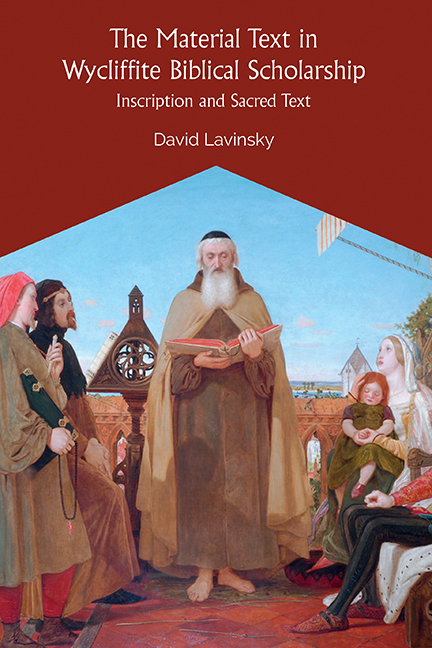Book contents
- Frontmatter
- Dedication
- Contents
- List of Illustrations
- Acknowledgements
- Abbreviations
- Introduction
- 1 “De Pellibus Bestiarum”: Scripture, Realism, and Material Form
- 2 “Stories of þe elde testament”: Adherence, Supersession, and the “Proces” of Reading
- 3 “We speke not of enke and parchemyn”: Voice, Form, and Textual Supplement
- 4 Rolle's “blessyd boke”: Heresy, Interpolation, and the Material Text
- 5 The “sentence of olde holy doctouris”: Gospel Commentary and the Materialities of the Literal Sense
- Conclusion
- Select Bibliography
- Index
- Frontmatter
- Dedication
- Contents
- List of Illustrations
- Acknowledgements
- Abbreviations
- Introduction
- 1 “De Pellibus Bestiarum”: Scripture, Realism, and Material Form
- 2 “Stories of þe elde testament”: Adherence, Supersession, and the “Proces” of Reading
- 3 “We speke not of enke and parchemyn”: Voice, Form, and Textual Supplement
- 4 Rolle's “blessyd boke”: Heresy, Interpolation, and the Material Text
- 5 The “sentence of olde holy doctouris”: Gospel Commentary and the Materialities of the Literal Sense
- Conclusion
- Select Bibliography
- Index
Summary
This study has examined a theoretical discourse about the nature and authority of scripture together with the vernacular biblical scholarship that extended from and reframed some of its major premises. The crucial reference point for much of this work has been John Wyclif 's academic writing, and, within such contexts, his efforts to imagine the Bible as a “book” inured to the logical and grammatical methods of scholastic intellectuality, here implicated most urgently in Wyclif 's late reassertion of realism. This results in something more ambiguous and theoretically suggestive than a “treatise” on biblical hermeneutics; while De Veritate Sacrae Scripturae is most definitely concerned with proper interpretation, proper interpretation itself hinges on a sweeping revaluation of all that which is “perceptible through voices and manuscripts,” thus marking off the materialist problematic of this study (99). To recall a passage discussed at length in chapter one, “scripture is not merely some sort of sign,” for if it were, “then all holy scripture could be damaged by a leather-worker, authorized by a scribe, torn apart by a dog, and corrected by a buffoon, as if it were liable to such defilement” (99). Far from reductive polemic, this and other such moments reveal how intensely attuned Wyclif is to the materiality of voces et scripta. Thus he exhorts the “subtle theologian” (subtilis theologus) to adopt a logic and grammar consistent with the sanctity of scripture's subject matter, the permanence of its divinely inscribed meaning, and its salvific purpose as a book – all ambitions which for him converge under the auspices of the liber vitae.
Although Wyclif is a constant presence in these pages, his thought a framework for thinking about the movement's work more broadly, the preceding chapters largely depart from genealogical models for intellectual or religious history. Wyclif 's individuation as “source” or “origin” of ideas mediated intact to the laity must be acknowledged in certain crucial respects, of course; during roughly the same stretch of time discussed in this book, or roughly 1380 to 1420, vernacular theology arguably reinforced the political and ecclesiological views that made the movement suspect in the eyes of authorities, such as Wyclif 's anti-sacerdotalism or his understanding of dominion.
- Type
- Chapter
- Information
- The Material Text in Wycliffite Biblical ScholarshipInscription and Sacred Truth, pp. 242 - 248Publisher: Boydell & BrewerPrint publication year: 2017



